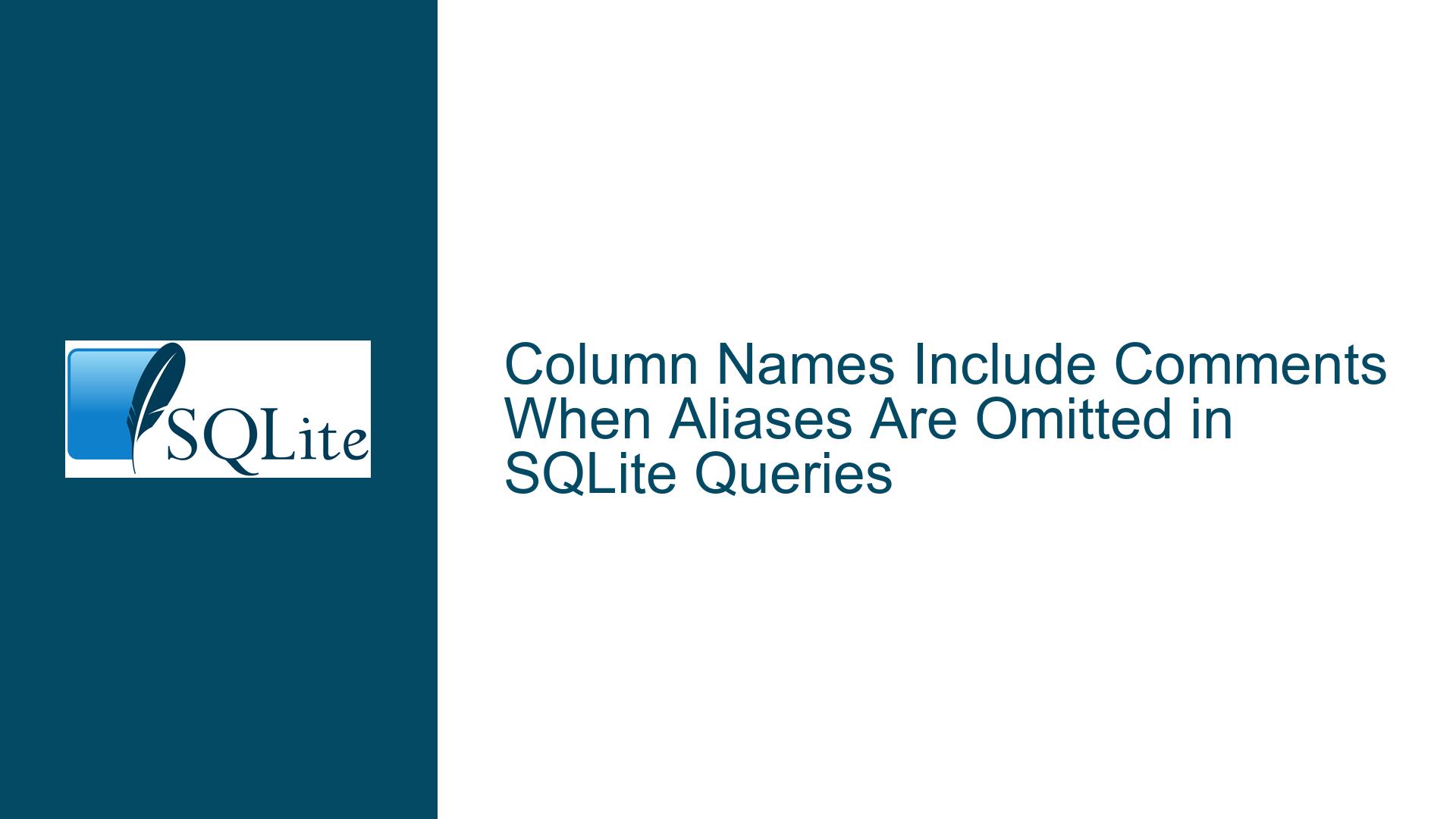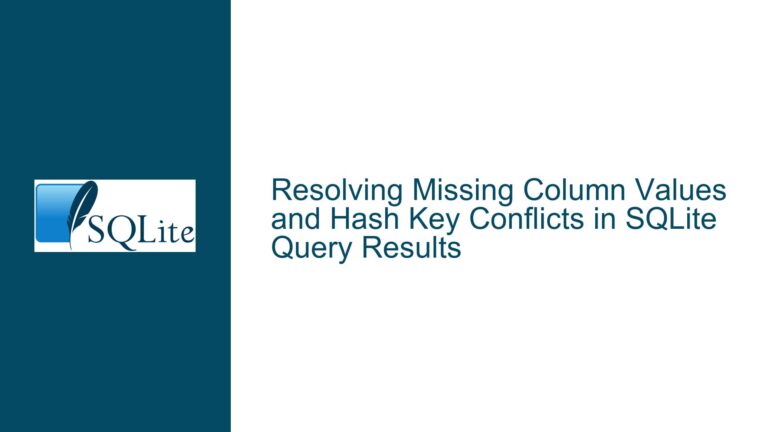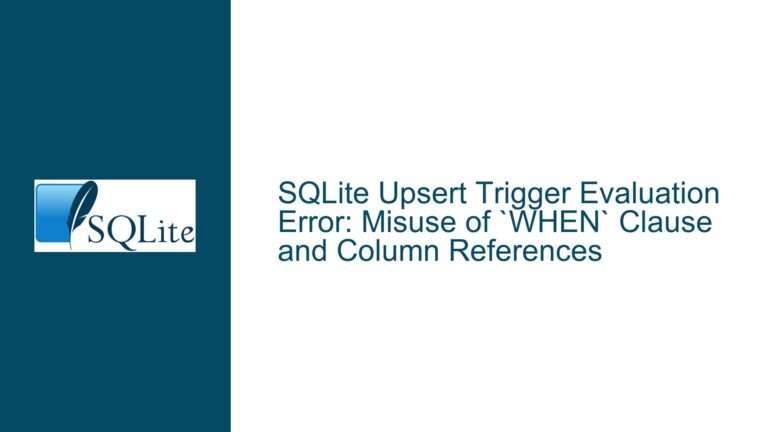Column Names Include Comments When Aliases Are Omitted in SQLite Queries
Column Names Unexpectedly Include Comment Content in Query Results
When executing SQLite queries that include inline comments within column expressions without explicit aliases, users may observe comment syntax (such as /* ... */ or --) appearing verbatim in result set column headers. This occurs in scenarios where columns are defined without an AS clause to specify their output name. For example:
-- Column expression with trailing comment
SELECT 1 /* <-- some comment */;
-- Column expression with comment and explicit alias
SELECT 1 /* <-- some comment */ id;
In the first query, the result column name becomes 1 /* <-- some comment */, while the second query produces id as the column name. The absence of an explicit alias in the first case leads SQLite to derive the column name from the entire text of the expression, including comments. This behavior is not a parsing error or implementation bug but stems from SQLite’s rules for automatic column naming when aliases are omitted. The confusion arises from differing expectations about how comments are handled during query parsing versus column name derivation.
This issue impacts tools and applications that programmatically consume query results and depend on predictable column names. It also affects command-line users of sqlite3 who rely on -box, -column, or other output formatting modes where column headers are displayed. Misinterpretation of this behavior as a defect is common, making it critical to understand SQLite’s parsing logic and column naming conventions.
SQLite’s Automatic Column Naming Behavior and Comment Parsing
The root cause lies in SQLite’s handling of column expressions that lack explicit aliases. When no AS clause is present, SQLite generates column names using an algorithm defined in its documentation. Key aspects of this behavior include:
Expression Text as Column Name Basis:
SQLite uses the original text of the column expression (excluding leading/trailing whitespace) to generate a default name. This includes all characters between theSELECTkeyword and the next comma orFROMclause, except for outermost parentheses. Comments embedded within the expression are treated as part of the text unless they alter the effective expression boundaries.Comment Stripping During Parsing:
While SQLite removes comments during the parsing phase, this stripping occurs after the column name derivation process. The parser first identifies column expressions, derives their default names, then eliminates comments for actual query execution. This sequence means comments influence column names even though they don’t affect the executed logic.Ambiguity in Expression Boundaries:
In queries with complex expressions, SQLite’s lexer may misinterpret where a column expression ends, especially when comments precede or follow operators. For example, a comment placed after a literal value but before an alias introduces ambiguity about whether the comment is part of the column name or a standalone annotation.Documented Lack of Guarantees:
SQLite explicitly states that default column names are undefined when aliases are omitted. Applications relying on these names withoutASclauses are considered fragile. This is outlined in the SQLite documentation forsqlite3_column_name(), which notes that default names may vary across SQLite versions or query formulations.
The interaction between comment placement and automatic naming explains why the first query in the example includes the comment in the column header. The absence of an AS clause forces SQLite to derive the name from the raw expression text, including the comment. When an alias is provided (as in the second query), the comment becomes irrelevant to the column name derivation.
Enforcing Consistent Column Aliases Using Explicit AS Clauses
To eliminate unpredictability in column names, adopt these strategies:
1. Always Use Explicit Aliases for Column Expressions
Add an AS clause to every column expression requiring a specific output name, even for simple literals or single-column references. This overrides SQLite’s automatic naming and ensures comments do not affect results:
-- Preferred: Alias before comment
SELECT 1 AS id /* <-- some comment */;
-- Alternative: Alias after comment
SELECT 1 /* <-- some comment */ AS id;
Both forms produce id as the column name. Place comments outside the AS clause to avoid syntax errors. Note that AS has higher precedence than comment parsing, making it safe to position comments before or after the alias.
2. Standardize Comment Placement Relative to Aliases
Establish coding conventions for comment placement to avoid accidental inclusion in column names. For instance:
- Place inline comments after semicolons terminating statements.
- Use line comments (
--) preceding column expressions for annotations. - Reserve block comments (
/* ... */) for explanations within complex expressions, ensuring they’re enclosed in parentheses or separated by operators.
3. Validate Column Names Programmatically
In applications processing SQLite results, validate column names against an expected schema. Use the sqlite3_column_name() API or equivalent in your language’s SQLite driver to check names at runtime. For ad-hoc queries in the sqlite3 CLI, leverage the .schema and PRAGMA table_info commands to compare expected versus actual column names.
4. Preprocess Queries to Remove Ambiguous Comments
For dynamically generated SQL, implement a preprocessing step that strips comments from column expressions lacking aliases. Use regular expressions or SQL parsers to identify unaliased expressions and either add default aliases or remove problematic comments.
5. Understand Cross-Version Behavior
Test queries across SQLite versions if your project supports multiple environments. While the core behavior around automatic naming is stable, edge cases involving comments may vary slightly due to parser improvements.
6. Compare with Other Database Engines
Recognize that SQLite’s approach differs from systems like PostgreSQL or MySQL, which may ignore comments in default column names. For cross-database compatibility, explicit aliases are mandatory.
By adhering to these practices, developers avoid reliance on SQLite’s implicit column naming rules and ensure consistent, maintainable query results. The explicit use of AS clauses is a low-effort, high-reward discipline that eliminates entire categories of column name-related bugs.






